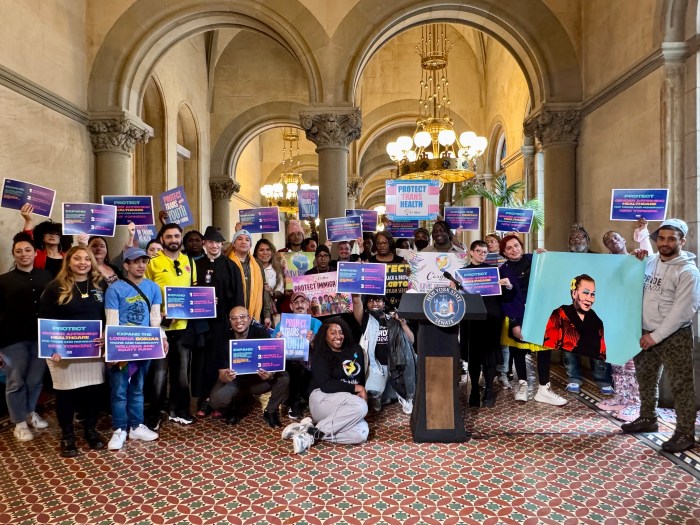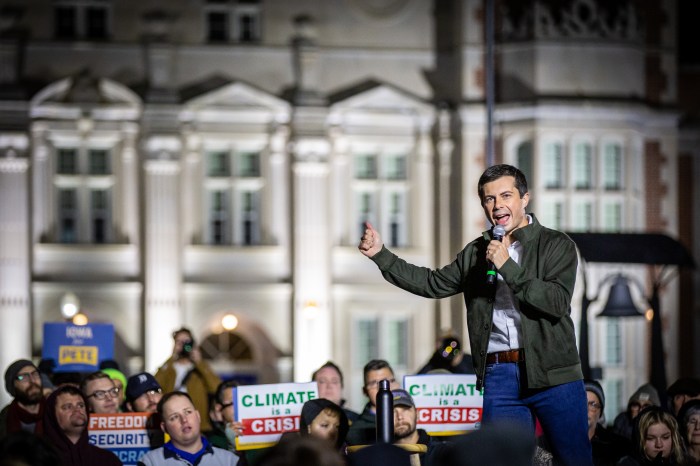Paul Curtis gave a sermon in 2008 that had a promising title –– “Stuff That Was Never Supposed To Be A Part Of The Movement of Jesus –– Homophobia.”
The pastor of Brooklyn’s Crossroads Christian Church told his flock that he approached “the issue with a lot of humility” and he “wrestled with the scriptures.” Curtis expressed compassion for gay men and lesbians, denounced anti-gay views, and acknowledged “the complexity of the issue.”
Then he went right to a position that will offend many in the gay community.
“Homosexual acts are wrong, that they are considered sin to God,” Curtis said.
That was not all. Counseling can relieve a sinner of this burden, he asserted.
“I also know others, know of others, who are gay who have been able to get to a place of heterosexuality,” he said. “I also have a good friend who has gone to counseling for years and has not been able to, and he has come to the point that he has accepted the fact that he may never be heterosexual and that God is okay with him… He is abstinent, and he lives a life of full participation as a follower of Jesus.”
Crossroads was one of an estimated 54 to 160 churches that were meeting in New York City schools until the city began to enforce a ban on worship services in its schools on February 12. Crossroads was not alone in promoting change for gays.
“I wouldn’t say it’s an anti-gay message,” Sam Andreades, the pastor of the Village Church, told Gay City News. “The West Village is the heart of alternative. We’re providing an alternative for people who experience same-sex attraction, but do not wish to own it.”
The church held services in a grade school on Hudson Street for three years, though its ex-gay ministry, the Gender Affirming Ministry Endeavor (GAME), did not meet there. GAME is affiliated with Exodus International, a ministry that has 260 member organizations and claims to aid individuals in ending their homosexuality.
For some in the lesbian, gay, bisexual, and transgender community, allowing these churches in the schools, charging them relatively low fees, is akin to having taxpayers subsidize the churches. How many of those churches use anti-gay messages is unknown, but there are hints that it is widespread.
In 2001, the Bronx Household of Faith sued the city to be allowed to meet in a city school. Jack Roberts, a pastor there, said at a February 2 City Council hearing that gay men and lesbians could attend services, but could not become members.
“We don’t allow people who are not baptized or who have a lifestyle contrary to the word of God,” Roberts said.
Fernando Cabrera, a Democratic City Council member who represents part of the Bronx and leads a church in that borough, organized protests against the city worship ban. In 2011, Cabrera joined a City Hall rally against the same-sex marriage legislation being considered then in Albany.
“At the level of doctrine, the churches I attended were very clearly opposed to what they considered to be the ‘unBiblical lifestyle’ of same-sex relationships,” Katherine Stewart, the author of “The Good News Club: The Christian Right’s Stealth Assault on America’s Children,” a 2012 book, wrote of her research for the book in an email message.
Details about some other churches that meet in public schools suggest that the overall picture is mixed.
Karim Camara is the pastor at Brooklyn’s Abundant Life Church and a member of the State Assembly. In 2011, he voted for the bill that authorized same-sex marriages in New York.
Zach Martin, the pastor at Park Slope’s Sovereign Grace City Church, told Gay City News that “The Bible describes the practice of homosexuality as sin,” but it not was a topic he had preached on.
“It’s not something that comes up in our church services often,” he said. “It’s not a predominant theme in the scriptures.”
Most of the churches that Gay City News called or emailed did not respond or they declined to comment.
On February 6, the State Senate passed legislation that would require the city to rent space to churches in a 52-to-7 vote. The State Assembly is considering the bill, though its speaker, Lower East Side Democrat Sheldon Silver told Gay City News he is looking at a potential compromise, describing the Senate measure as “overly broad.”
The City Council is weighing a resolution, initiated by Cabrera, to support that state legislation, though in a February 27 email, Council Speaker Christine Quinn’s office wrote, “Speaker Quinn believes strongly in the separation of church and state as a critical element of our democracy, she has shared her concerns directly with Council Member Cabrera, and informed him that she does not support his resolution.” Other Council members who initially signed on to the resolution have since withdrawn their names.
Still, some observers are dismayed that some progressive and gay-friendly elected officials are supporting the resolution and the legislation.
“Conservatives have pitched their case in terms of ‘religious freedom’ and anti-discrimination,” Stewart wrote. “Liberals and moderates may fail to understand that, for the right, ‘religious freedom’ means the freedom to impose their religion on other people or, in the instance of church planting, the freedom to get the state to fund their religion.”
The federal judge hearing the case initiated 11 years ago, Loretta A. Preska, found for the Bronx church last year, though she was overruled by an appeals court. On February 16, Preska issued a temporary restraining order that barred the city from enforcing the worship ban, and that same appeals court responded by limiting the ruling to just the Bronx church. Preska ruled for the church again on February 24 and barred the city from applying the ban to the Bronx church or “any similarly-situated individual or entity.”
The city immediately appealed Preska’s latest ruling, setting the stage for yet another round in the unusual back and forth between the District Court and the Second Circuit Court of Appeals. [On February 29, after this story was published, the city Law Department issued a release stating, “The Second Circuit Court of Appeals denied the Department of Education's motion for a stay of the preliminary injunction pending appeal.]
Preska was nominated by President George H. W. Bush in 1992 at the request of Al D’Amato, a Republican senator. President George W. Bush nominated Preska for a federal appeals court judgeship in 2008, but she never had a hearing.
In 2008 and 2009, Preska moderated events sponsored by the Federalist Society, a right-wing legal group, and she was identified as a member of the advisory board of Fordham University’s Federalist Society chapter. Other biographies from that time said she was a Federalist Society member. Her office did not respond to a call seeking more information.




























